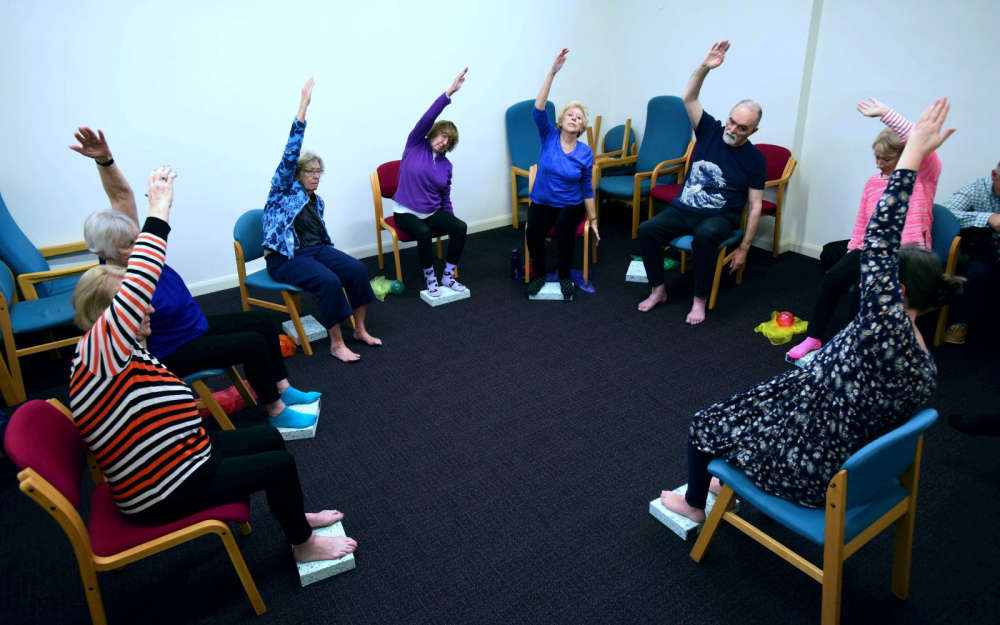
Researchers from the University of York, York St John University and Northumbria University have successfully completed the world’s largest ever study into the benefits of chair-based yoga for older people with multiple long-term health conditions.
The study, which was funded by the National Institute for Health and Care Research (NIHR), found that a specially designed 12-week yoga programme did not, on average, lead to improvements in quality of life, mental health, loneliness, or the rate of falls when compared with usual care alone. However, the programme was safe, acceptable to most participants, perceived as useful by some, and likely represents good value for money for the National Health Service.
Many older people have multiple long-term health conditions, which can lead to shorter life expectancy and reduced quality of life. Some conditions can be managed with medicines or other treatments, so some people experience little impact on their lives, while others might need significant healthcare support.
The British Wheel of Yoga’s Gentle Years Yoga programme was specifically designed for older adults, including those with long-term health conditions. It is a chair-based yoga programme that aims to improve muscle strength, flexibility, balance, mobility, and mental and social wellbeing.
The trial involved two groups of people aged 65 years and over with two or more long-term health conditions. A 240-strong group were offered 12 weekly, group-based yoga classes, which were delivered either face to face or online. The second control group of 214 people were not offered any yoga and continued with their usual care. All participants completed a study questionnaire on entry to the trial as well as 3, 6 and 12 months later. The study’s main focus was on health-related quality of life, which was measured using a validated and commonly used EuroQol 5-dimensions (EQ-5D) questionnaire. The final report for the study was published in Health Technology Assessment this week.
Chief Investigator Professor Garry Tew, who is Director of York St John University’s Institute for Health and Care Improvement, said:
“Many older adults have two or more long-term health conditions. Yoga has the potential to improve several aspects of health and wellbeing. We therefore set out to comprehensively test the effects of a specially designed yoga programme in this population, as well as what people thought about it, and if it would represent good value for money to the NHS.”
“While previous studies have focused on the short-term benefits of yoga, we also wanted to explore longer-term effects and collected data from participants over 12 months. Our results are mixed. On the one hand there was no clinically meaningful differences in quality of life or any of the other main study outcomes. However, the data also indicate that the yoga programme is safe, positively experienced by many people, and probably good value for money. Overall, it appears reasonable to suggest that healthcare professionals or social prescribing link workers could consider recommending self-funded Gentle Years Yoga classes where it appears a good fit with an individual’s needs and preferences.”
Di O’Reilly, Chair of the British Wheel of Yoga (BWY) said:
“While we are disappointed by the mixed results following the successful pilot study, it is evident that yoga can be a transformative practice for some. As a yoga teacher with older adults in my class, I understand the invaluable role that social interaction plays in enhancing wellbeing. The challenges posed by the COVID-19 pandemic undoubtedly would have greatly impacted this. I strongly believe that the Gentle Years Yoga programme is an invaluable resource for older adults living with health challenges and we will continue to promote it as a tool to enhance wellbeing in the longer term.”
Following completion of the yoga programme, interviews were also conducted with some of the participants and all 12 yoga teachers to explore their experiences of the programme. Some yoga participants noted no or only a modest impact on their health or lifestyle, while others described Gentle Years Yoga as transformative and having substantial impacts and improvements on their physical health and emotional wellbeing. Participants in the yoga programme were surveyed 9 months after classes had finished and around half of those who responded were still regularly practising yoga, mostly at home, three times a week.
Find out more about the Gentle Years Yoga Trial. Yoga teachers and health professionals can also learn more about the programme on the British Wheel of Yoga’s website.


